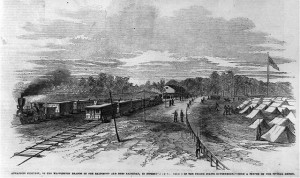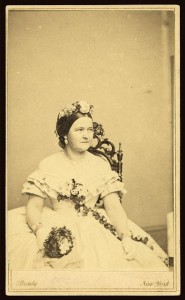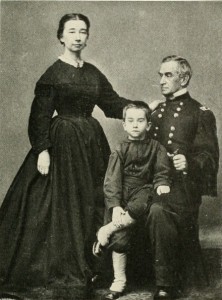And, “Hunger Is the Best Sauce”
Apparently Mrs. Lincoln is going to visit Robert Todd at Harvard. Here’s a story about her trip from the White House to Astor House.
From The New-York Times May 12, 1861:
FROM WASHINGTON TO NEW-YORK.; ARRIVAL OF MRS PRESIDENT LINCOLN–COL. ANDERSON–INCIDENTS OF THE TRIP …
Mrs. LINCOLN, wife of the President of the United States, with her sister and niece, arrived in town yesterday morning, and the party are stopping at the Astor House. Col. (late Major) ANDERSON escorted the ladies from Washington, whence they came by the 10 1/2 A.M. train, Friday, as far as Philadelphia, and SIMEON DEAPER, Esq., conducted them during the remainder of the journey to this City. Mrs. LINCOLN has come North mainly to visit her son ROBERT, who is at college.
Col. ANDERSON has accepted the leadership of the brave men of Kentucky who have rallied in defence of the Union. He will hasten to his command, and perfect its organization, after which it will report to the Government for service.
On the trip from Washington to Annapolis, thence on the boat to Perryville, and all the way to Philadelphia, the distinguished company received at every stopping-place abundant evidence of the esteem in which they are held by loyal and true-hearted Americans. The news of their approach spread from station to station, and the troops which line the route, as well as large numbers of citizens, awaited their coming, and greeted them with deafening cheers of welcome. Of course the gallant hero of Fort Sumter was the principal cause of the ovation, and he acknowledged the compliment by presenting himself at the car window, not infrequently addressing the soldiers briefly with reference to the duty which had called them to arms. It took nine hours to make the journey from Washington to Philadelphia, and the ladies being too fatigued to push on to New-York by the “owl train,” which arrived here at 4 1/2 A.M., the entire party passed the night in the City of Brotherly Love.

At the junction, Annapolis Junction - under federal control(Frank Leslie's 06-01-1861 LOC - LC-USZ62-90547)
The passengers from Washington had an excellent opportunity of witnessing some of the hardships and inconveniences which our volunteers contend with. The Fifth Regiment of New Jersey protects the railroad from the Capital to Annapolis Junction, and the Fifth of New-York, (Col. SCHWARZWAELDER’s regiment,) from the latter place to the City of Annapolis. Stations are erected for the troops at average intervals of a mile apart, — a convenient barn usually affording them shelter, and on such a rainy, raw and chilly day as Fiiday, the poverty of these quarters was made painfully apparent. The sentinels looked dismal enough, as crouched in their wet overcoats they wearily paced the railroad track. But the damp weather was insufficient, apparently, to dampen the enthusiasm of the men “off guard,” who stifled every feeling of commiseration which might have arisen for their discomfort, by the rollicking good humor which so prominently characterizes them. No better exemplification either, of the adage that “hunger is the best sauce,” could have been afforded, than by the avidity with which the troops seized the meat and stores furnished for the day’s subsistence. The provisions are dealt out from the regimental head-quarters, and distributed at every station by the cars, which merely slacken their speed sufficiently to allow of the rations being thrown out to the expectant cooks. Down they go, splash into the mud, and no amount of washing can possibly cleanse them of the gravel and dirt. Nevertheless, this mud grimed meat, which ordinarily would be too disgusting to eat, is partaken of with hearty relish when the man has been metamorphosed into the soldier, and the fact shows how human nature adapts itself to circumstances. …
The rest of The Times story includes spies at the Naval Academy grounds and an attack near Fort Madison by 25 Maryland secessionists. Apparently there was enough federal control along the railroad and Chesapeake Bay for Mary to take the trip. Also, Mary was pretty fiery and she was going to see her son. The Chesapeake detour around Baltimore might have been a nice boat trip, but it seems that early May 1861 on the north-eastern seaboard was cold and damp. I think it even snowed places around May 3rd.
This Times article seems to line up with what Wikipedia says about the post-Sumter career (in 1861 at least) of Robert Anderson:
Anderson then went on a highly-successful recruiting tour of the North. His next assignment placed him in another sensitive political position, commander of the Department of Kentucky (subsequently renamed the Department of the Cumberland), in a border state that had officially declared neutrality between the warring parties. He served in that position from May 28, 1861, until failing health required his replacement, by Brig. Gen. William T. Sherman, on October 6, 1861.


